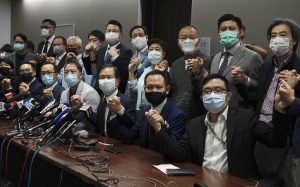In Hong Kong’s postcolonial era, the city’s legislative council has functioned without opposition lawmakers just once: during the year of the handover in 1997.
Through negotiations a decade before, Beijing and the U.K. agreed that members of the Legislative Council, or LegCo, elected prior to the handover would continue to serve until the next election. Yet after Chris Patten, the city’s last governor, ushered in a series of democratic reforms that was perceived to challenge Chinese interests in Hong Kong post-handover, the arrangement broke down.
Instead, Beijing set up a provisional legislative council that consisted of 60 members chosen by a 400-member committee in 1996, and the Democratic Party refused to participate until the first post-colonial election in 1998. Since then, LegCo has been dominated by two camps – pro-democracy and pro-Beijing – and has been a symbol for the “One Country, Two Systems” framework granting Hong Kong local autonomy for 50 years following the handover.
Until now, that is.
Last week, Beijing’s top legislative body ruled that lawmakers who supported independence, refused to admit China’s sovereignty over the city, or threatened national security should be expelled. Following this, Hong Kong’s government disqualified four opposition legislators who have lobbied foreign governments to impose sanctions on Beijing – after it imposed a national security law on the city – and vowed to veto the government’s budget. Soon after, most pro-democracy legislators resigned in protest, leaving only two LegCo members who are not pro-establishment.
The move is a serious blow to Hong Kong’s political system and rule of law. It not only sets a precedent for authorities to dismiss lawmakers without approval from the courts or LegCo, but also paves the way for more features of Hong Kong’s legal system to be circumvented and excluded in cases that touch upon national security. “The situation now is hopeless,” said Jackie (a pseudonym) a 23-year-old activist who participated in last year’s pro-democracy movement as a frontline protester. “I think most Hong Kongers were not surprised at all.”
By forcing out pro-democracy legislators from LegCo, authorities have snuffed out one of the last remaining official channels for voicing dissent and holding the government accountable, making it easier for controversial laws to be passed without opposition. Although legislators have always had limited power, they do approve the government’s budget and can examine matters of public concern, as well as recommend to Beijing the dismissal of the chief executive.
Hong Kong’s chief executive Carrie Lam has rejected suggestions that the lack of opposition legislators would tarnish LegCo if the body passed policies supported by the pro-Beijing camp, The New York Times reports. Yet critics say the disqualification strengthens the notion that the legislature has become nothing more than a rubber stamp parliament – a reality that many pro-democracy supporters argue has been true for quite some time now.
From Jackie’s perspective, the legislature lost its legitimacy back in 2016, when six democratically elected pro-democracy lawmakers were disqualified for failing to take their oaths properly in an incident known as “Oathgate.” The fact that lawmakers could be disqualified in such a manner shows that the system is broken and that election victories are symbolic rather than genuine, Jackie said.
“LegCo is not really a proper place to fight for freedom and democracy,” Jackie said, adding that pro-democracy legislators should have resigned en masse back in 2016, or in September when the LegCo elections were postponed for a year by the government reportedly for coronavirus-related reasons. “In the government structure, we can now focus on the District Council (which handles community-level affairs). But we still need to find another way out on the streets or on the international frontline.”
In recent years, filibustering by pro-democracy legislators – one of the few tactics available – has tested Beijing’s patience and led the pro-establishment camp to become increasingly frustrated. Gridlocks in LegCo have led to delays in passing policies, as well as chaos, critics have argued. Pro-government groups say they have collected more than 2.18 million signatures in support of the disqualification during a five-day public petition campaign, according to Hong Kong Free Press.
Rather than focusing on the legislature, Jackie will instead channel efforts into serving the city’s growing number of unions, donating to political parties, and participating in civil society activities, both in the city and in diaspora communities moving forward.
“There are a lot of people in Hong Kong who only come out to show support for democracy in big rallies or elections,” Jackie said. “These people will have to face the truth that their vote is not useful anymore.”
































